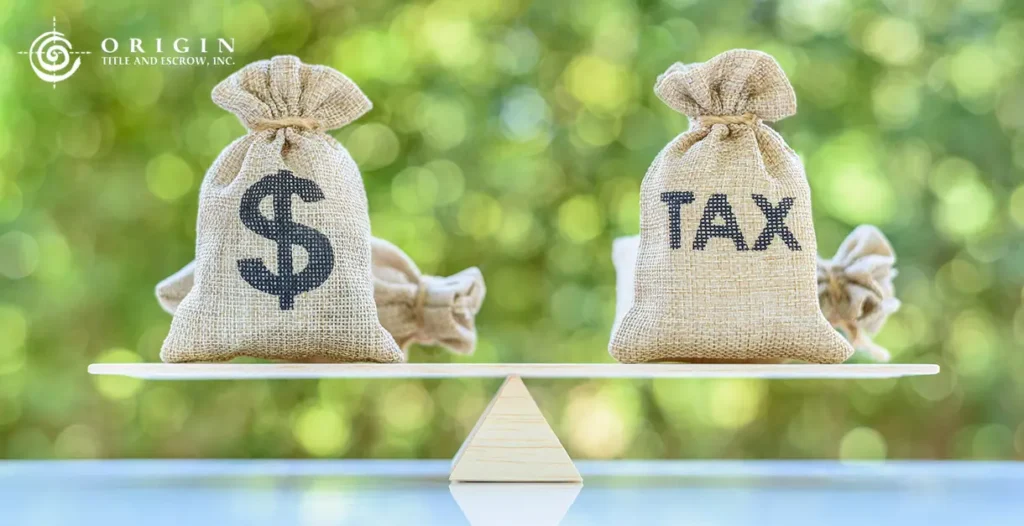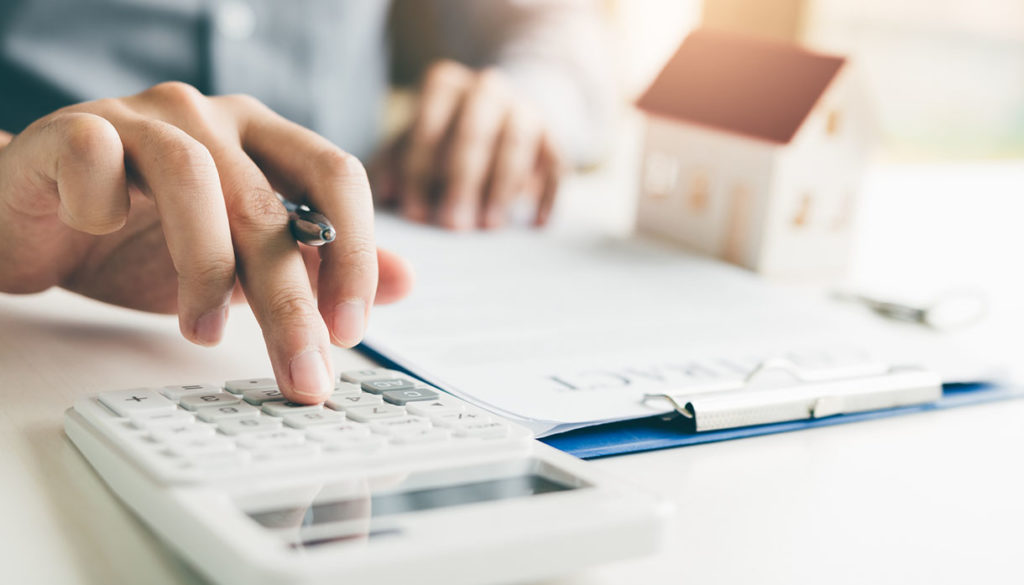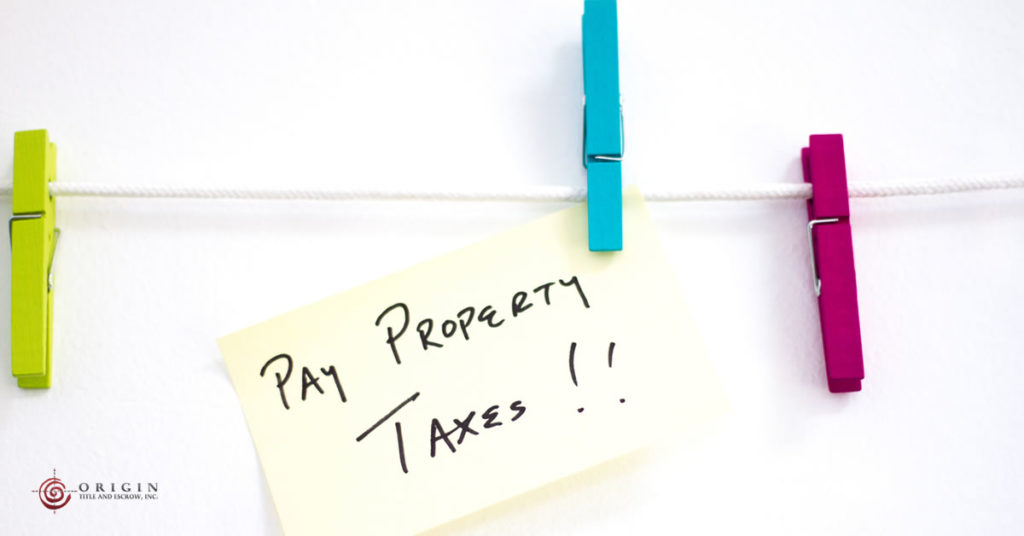Taxes
1031 Exchanges
In real estate, capital gains tax is normally due on the seller’s gain when selling investment property. The gain is the difference between the basis and the sales price. The basis is the purchase price from when the seller purchased the property, plus any amount spent for improving the property.
For example, if an investor paid $100,000 to purchase property and later sold it for $150,000, capital gains tax would be due on the $50,000 gain.
1031 exchanges are used by real estate investors to delay or avoid paying capital gains tax on the sale of real property. It is normally not used for primary residences because there are other tax exemptions for the sale of a primary residence.
Basically, a 1031 exchange is when the owner sells real estate and uses those proceeds to purchase up to three other properties.
The funds are held by a Qualified Intermediary and must be used to purchase ‘like kind’ property. When selling, the owner never has access to the sales proceeds because the funds are sent to the Qualified Intermediary. If all the funds are not used for another purchase, the owner would have to pay taxes on the funds not used. The Qualified Intermediary will send the funds to the closing attorney or title company for the purchase of the new property.
The property being purchased must be ‘like kind.’ The IRS has a fairly loose definition of what ‘like kind’ means. The purchased property does not need to be exactly like the property sold. Almost any investment property will be considered ‘like kind.’ The quality of the property does not matter at all either. Almost any real property will be considered investment property if it is being held for an investment. Vacant land can be exchanged for a strip mall as long as it is being held as an investment and not being developed.
The closing process is not much different from a regular closing. The only difference is that the funds are either sent or come from the Qualified Intermediary. The individuals still sign all the closing documents the same as they would in a regular closing. The Qualified Intermediary will also need to sign the closing statement in most transactions.
The sale and purchase are not taxable events when using a 1031 exchange. The Qualified Intermediary will charge fees to hold the funds and create the forms required by the IRS. The actual closing costs will be the same except for the Qualified Intermediary fees. It is an easy tool to delay or avoid capital gains taxes when selling investment real estate.
John C. Bennett is a real estate closing attorney and owner of Origin Title and Escrow, Inc.. Since 2003, Origin Title has handled real estate transactions – purchases, refinances, reverse mortgages – quickly and professionally. There will be no surprises, nothing misunderstood. Title searches are thorough and well-reasoned, to avoid unpleasant surprises later down the road. Calculate your closing costs in Georgia or Florida using our calculator or contact Origin Title using this form.
Deed Taxes and Recording Costs
Georgia charges a flat fee of $25 per document to record in the real estate records. For e-recording, most counties add fifty cents, (Fulton county adds two dollars), as a convenience fee. There are several e-filing service companies that add their own fees to the cost of recording documents.
The flat fee is great because we do not have to worry about the number of pages of each document. In the past, Georgia charged $10 for the first page plus $2 for each additional page. The problem was that we often had to provide the recording fees without knowing how many pages were in the documents.
There are two other costs for deeds and security deeds/mortgages.
For a purchase, the county will collect .1% of the sales price as the transfer tax. For a mortgage, the county collects $1.50 for every $500 (or portion thereof) borrowed as the intangible tax.
Of course, there are exceptions to both transfer tax and intangible tax. Transfer tax is not due on several types of conveyances. These include transfers between a couple pursuant to a divorce, part of an inheritance from an estate, deeds in lieu of foreclosure, if a party is a government entity, and if a party is a public authority or nonprofit public corporation.
The intangible tax applies to all loans secured by real estate that have a maturity date more than three years from the date of the loan.
Failure to pay the intangible tax due on a security Deed bars any foreclosure of the Security Deed. The lender may foreclose upon paying the required tax due.
Security Deeds/Mortgages must be filed and the intangible tax paid within 90 days of being signed by the borrower. The penalty for filing after 90 days is 50% of the intangible tax due plus monthly interest.
The exceptions for intangible tax include loans where the lender is a Georgia Credit Union, a Federal Credit Union, the lender is a government entity, the lender is a public nonprofit corporation or the lender is a church.
Intangible tax can be lowered if the loan is a refinance with the original lender. The intangible tax due on a refinance with the original borrower and original lender will be based on the difference between the new loan amount and the current principal balance of the existing loan.
John C. Bennett is a real estate closing attorney and owner of Origin Title and Escrow, Inc.. Since 2003, Origin Title has handled real estate transactions – purchases, refinances, reverse mortgages – quickly and professionally. There will be no surprises, nothing misunderstood. Title searches are thorough and well-reasoned, to avoid unpleasant surprises later down the road. Calculate your closing costs in Georgia or Florida using our calculator or contact Origin Title using this form.
Property Tax Exemptions
Once you have purchased your new home, now you have to pay taxes on the property. Property taxes vary quite a bit from county to county, and there are additional property taxes for many incorporated cities in Georgia.
The tax assessor is responsible for determining property values and granting or denying tax exemption applications. The tax commissioner is responsible for collecting property taxes based on the value and exemptions provided by the tax assessor. The county board of commissioners, or other municipal authority, and the Board of Education will set the millage or tax rate. Property taxes are a combination of the tax rate and value of the property, as determined by the tax assessor.
Each year, the tax assessor will send a notice to each homeowner with the property assessed value and estimated tax to be applied to that property. The homeowner normally has about thirty days to appeal the assessed value set by the tax assessor.
There are several real estate property tax exemptions that are statewide in Georgia. Counties and municipalities can offer additional property tax exemptions (and the exemptions can change).
No exemptions are automatic. Homeowners must apply for every exemption for which they qualify. The county tax assessor processes property tax exemption applications, so the forms may be a little different in each county.
In every county in Georgia, homeowners can apply and get a standard homestead exemption if the property is occupied and used as the primary residence of the owner. Georgia offers additional property tax exemptions for individuals 62 years old or older, 65 years old or older, and for disabled veterans.
Surviving spouses of disabled veterans also qualify for a property tax exemption as long as they are not remarried and continue to live in the house. Surviving spouses of U.S. Service members who died in a war or armed conflict are also eligible for a tax exemption as long as they do not remarry.
Surviving spouses of a peace officer (police) or firefighter killed in the line of duty can apply for a homestead exemption for the full value of the home for as long as they live in the home and do not remarry.
If there is a separate city or other municipality tax bill, then homeowners will have to apply for the exemption with both the county and the municipality. Exemptions can save homeowners thousands of dollars in property taxes, but it is the homeowner’s responsibility to apply for property tax exemptions.
Here is a link to a brief overview of the statewide exemptions provided by the Georgia Department of Revenue. https://dor.georgia.gov/property-tax-homestead-exemptions
John C. Bennett is a real estate closing attorney and owner of Origin Title and Escrow, Inc.. Since 2003, Origin Title has handled real estate transactions – purchases, refinances, reverse mortgages – quickly and professionally. There will be no surprises, nothing misunderstood. Title searches are thorough and well-reasoned, to avoid unpleasant surprises later down the road. Calculate your closing costs in Georgia or Florida using our calculator or contact Origin Title using this form.
Tax Aspects of Selling a Home
When selling a primary residence, some sellers pay no income tax on the gain. Paying taxes on the profit of a home depends on how long you owned and lived in the home, as well as how much money was made. If you lived in the home for at least two of the five years before selling and did not convert the property to investment property, up to $250,000 of the profit is tax-free, or up to $500,000 if you are married filing jointly. If the profit exceeds the $250,000 or $500,000 limit, the excess profit could be subject to capital gain tax.
There are additional special circumstances to note such as divorce settlement, death of a spouse, military service members, etc. Having an experienced closing attorney on your side that knows the rules helps to navigate this process.
If you bought a house in 2020, there are two things that should be done
First, is to apply for homestead exemption if you moved into the home by January 1st and it’s considered your legal residence. This exemption can offer a significant break on property taxes.
Second, is to keep your closing statement for preparing your tax return.
In addition to Homestead exemptions, most counties have additional exemptions for people 65 years old and older. Not knowing about these exemptions can cost thousands of dollars when the 2021 tax bill comes out.
Since these exemptions only have to be applied for once, it’s easy to forget about them. At Origin Title and Escrow, it’s our job to help our clients save as much money as possible.
Importance of Closing Before Year-End
January 1st is a very important date for new homeowners. All counties in Georgia provide a significant break on property taxes for people’s primary residence if they are the owner on record as of January 1st of that year. This is called the homestead tax exemption.
In order to qualify for the exemption, a person must own and live in the property on January 1 of that year and apply for the exemption before the deadline. The deadline varies from county to county, but it is typically either April 1st or May 1st. The homestead exemption is a significant savings on property taxes.
While it’s free to file a homestead exemption, it’s not automatic and must be applied for. Most counties allow homeowners to apply for the exemption all year-round, even if it will not be applied until the next year. Once applied and qualified for, this exemption is automatically renewed each year as long as the owner continues to occupy and own the home under the original ownership.
Real estate agents enjoy working with a closing attorney who understands homestead exemption deadlines.
WHO PAYS PROPERTY TAXES WHEN A PROPERTY IS SOLD IN GEORGIA?
Each state does property taxes a little differently. Some states don’t send a property tax bill until after the year is completely over.
In Georgia, the 2018 property tax bill covers the time from January 1, 2018 through December 31, 2018. If the property sale closes before the tax bill is mailed, the seller pays the buyer the seller’s portion of the tax bill at closing. When the bill does come out, the buyer must pay the full tax bill– even if the seller’s name is still on the bill. In our office we strive to give the buyer an accurate property tax credit at closing– but it is impossible to predict tax bills.
If either party didn’t pay the correct amount at closing, they need to settle-up once the tax bill comes out. Real estate agents don’t enjoy having the property tax discussion with buyers or with sellers, especially when the tax bills are higher than they have been in the past. They will welcome an introduction to a qualified closing attorney who can make sure both parties are aware that they may owe taxes to the other party once the tax bills are out.
ARE PROPERTY TAXES PAID FROM AN ESCROW ACCOUNT WITH A REVERSE MORTGAGE?
Reverse mortgage loans do not require an escrow account, because the borrower receives money, rather than making payments. Since conventional mortgages are usually set up to include property tax and homeowner’s insurance, how does the reverse mortgage loan holder pay for those elements? The borrower acquires and pays for insurance independently, and pays taxes directly to the tax authority.
On-time payment is essential, because if the borrower has paid property taxes late within the last three years, the lender will likely require a LESA account — a Life Expectancy Set-Aside account, which sets aside enough money to pay the property taxes every year of the remaining expected lifetime. Taxes and insurance payments must be paid on time after closing as well. Failure to pay taxes and insurance is considered in default for reverse mortgages and can result in foreclosure.
Does the LESA account really impact the borrower? It can be a big number if the borrower is younger: in 2015, the lender required a $73,000 LESA account deposit for a 62-year old, city of Decatur borrower.
Loan officers and reverse mortgage specialists enjoy working with a closing attorney who can explain the rules, requirements, jargon and singularities in reverse mortgages to homeowners.








